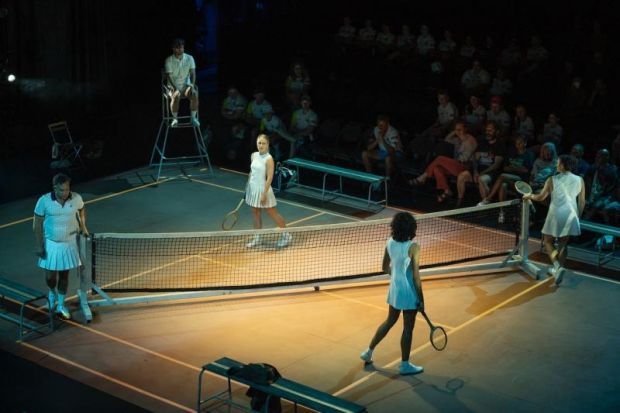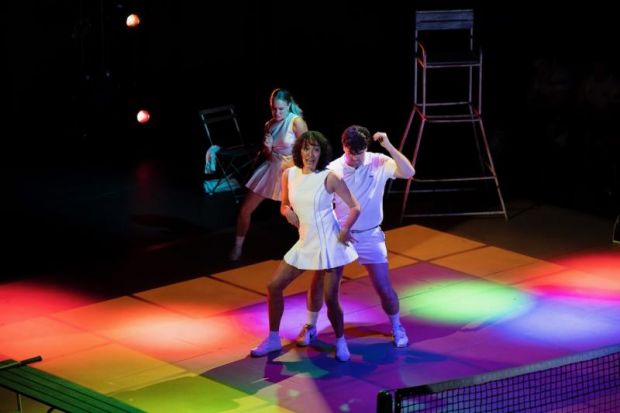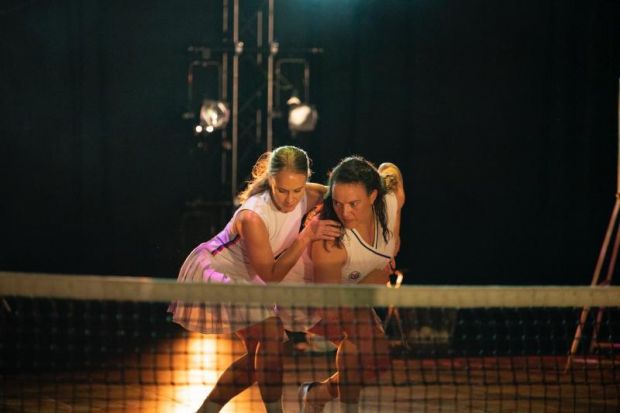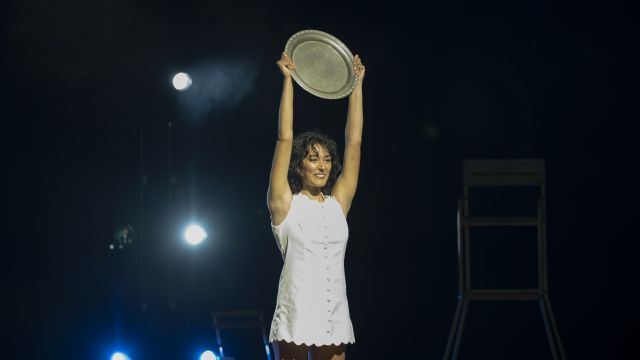Sunshine Super Girl
Ella Ferris (a Taribelang woman) is Wiradjuri woman Evonne Goolagong - from the three year old Griffith girl in a tin shanty with a dirt floor, to the top woman tennis player in the world - and wife and mother. Ella Ferris is at the sparkling centre of Sunshine Super Girl - and she holds the show together. She looks like an athlete, she’s charming and she has the lithe grace of a dancer. Evonne’s sweet sense of wonder when she flies in a plane for the first time, and her undiluted joy when she wins, never leaves her, but it is undergirded by a steely, focussed determination.
In Griffith, Evonne is already knocking a tennis ball against the wall, but things look up when the family - ever in fear of the ‘black car’ that could take one of them away - moves to Barellan, a small farming town. There - what luck - Evonne’s talent is recognised and the whole town is generous and supportive.

In telling Evonne’s story, Ferris is surrounded by a talented cast, all in tennis whites, who play Evonne’s family, her trainer, her super star opponents and the love of her life Roger Cawley (Wiradjuri man Lincoln Elliot, who also plays her Dad.)
The story plays out on a tennis court designed by Romanie Harper, set between two banks of spectators (us). Karen Norris’ lighting sweeps over the court and Mic Grucy’s video projections turn that court from red clay to grass - and floral carpet, and the Murrumbidgee River, where Evonne likes to fish - when she’s home on her country.
A distinctive and distinguishing element here is the indigenous connection between dance and storytelling. Initiated by Wiradjuri Choreographer Vicki Van Hout and developed by Wakka Wakka and Kombumerri Movement Director and cast member Katina Olson, dance does not just support the narrative. Often, it is the narrative, particularly in the intricate representation of hand, eye and body coordination that is the tennis players’ art. Clearly, in her time Evonne Goolagong was simply better at that than most of her opponents. A ‘natural’? Perhaps, but she was preparing since she hit that tennis ball against the house wall.

Movement as movement is an integral part of Sunshine Super Girl in the smooth, economic way the cast makes new locations by shifting some furniture or fruit boxes around. But there’s also the seamless way the ensemble segues into a multitude of characters via simple wardrobe changes or the addition of some body language, or a walk - Katina Olsen’s transformation into service station attendant, or Wuthathi woman Jax Compton’s Martina Navratilova - always to the delight of the audience.
On the surface, this is the simplest of storytelling - a period piece, a sequential series of events, no flashbacks, very little explaining, narrated by the protagonist, Evonne Goolagong Cawley (who was also, with Roger Cawley, a consultant and advisor on the development of the show). But clearly, it’s more than that. Based on research, interviews, and archival material, this ‘true’ story is in its way, the best of community theatre plus pantomime plus dance.
The audience, tennis fans or not, get hooked and involved: there are bursts of applause at Evonne’s victories on the tennis court; we stifle a tear when Mum (Jax Compton) stays up all night to make Evonne’s first tennis dress out of sheet; we groan when her coach Mr Edwards (Munanjali/Yugenbeh man Kirk Page) puts his hand on her knee; and we sigh, audibly thrilled when Roger shows up after a long absence. We feel for her, we care for her.

If I have the smallest reservation here it is that the play is all the rise and rise of Evonne Goolagong. Thank God the family moved to Barellan rather than, say, Walgett! Obstacles are brief - racism, sexual harassment, political harassment from her own mob when she opts to play in apartheid South Africa - or melt away. These things are ‘covered’ but without consequence. No snide remarks about Margaret Court either, but such things are not on Andrea James’ agenda. She stresses that the play is ‘not a documentary but a dramatisation for the stage.’ What she wants, I think, is to draw us in, to cheer Evonne on, to support her and admire her. In this she absolutely succeeds - and in the most warm, positive, and engaging way.
Michael Brindley
Photographer: Paz Tassone
Subscribe to our E-Newsletter, buy our latest print edition or find a Performing Arts book at Book Nook.

